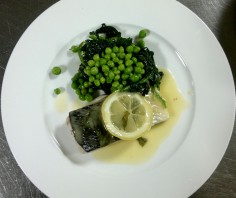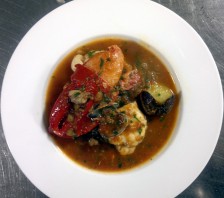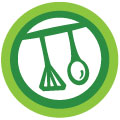 I was vaguely aware of Theo Randall as former head chef of The River Cafe but now found myself inside his restaurant, at The Intercontinental, which won the accolade ‘Italian Restaurant of the Year’ in 2008. It was at this plush but quiet Park Lane hotel that our small group convened for a masterclass from the man himself.
I was vaguely aware of Theo Randall as former head chef of The River Cafe but now found myself inside his restaurant, at The Intercontinental, which won the accolade ‘Italian Restaurant of the Year’ in 2008. It was at this plush but quiet Park Lane hotel that our small group convened for a masterclass from the man himself.
We were there to experience a taste of Italian summer, which had come early to Sicily and the South. The purpose of the course was to demonstrate the sheer quality of ingredients available. The first of these was a sea bass larger than a basking shark, slapped onto the worktop by Theo who then gingerly extracted a barely digested sprat from the dilated gullet. It was a bold and impressive introduction and demonstrated, along with the clear eyes and deep red gills, just how fresh this aquatic beast was.
Theo seemed keen to treat the bass with the utmost respect, gently swaddling large immaculately prepared fillets in lemon, basil and Vermouth-filled foil bags. This was to demonstrate how to retain the most flavour when cooking filleted fish, as many chefs, we were told, seem too concerned with getting the skin crispy in the pan and ignore flavouring the flesh. Sure enough the bass emerged, steaming and slicked in a rich sauce, smelling incredible and tasting even better.
This was the third course, which followed two equally simple and delicious Italian dishes. Theo cooks and talks about food much like an Italian, albeit with less gesticulation. His love of Italian food grew from childhood holidays where he was introduced to the simplicity of wonderful ingredients, refining his palate at an age when most other kids were building sandcastles.
First then, the antipasti: a warm, rustic salad of pan-fried squid with borlotti beans and rocket using basic flavourings of anchovy, parsley, garlic and chilli. We were shown how to clean and prepare the squid. Apparently the familiar criss-crossing is to ensure the squid curls up in the pan, helping it not to overcook. We were also advised to use a hot, dry pan and add the oil to the squid so it cooks quickly and doesn’t burn.
Tips flowed and Theo took his time to explain each process and answer all questions fired at him. At one point he broke from demonstrating the extraction of a lobster roe when he was asked if he does the same with scallops. Out of thin air, Theo produced a huge shell, containing a live scallop, which he took apart to explain that he always cooks the roe, as it is delicious, but many kitchens won’t keep it with the meat due to it’s shorter shelf life. Of course, the freshness of the scallop in this case rendered that fact utterly irrelevant.
Back to the lobster, which was used in the second course, or primi, both for its meat and its stock enhancing qualities. This neatly encapsulated another Italian tradition – that every part of the source ingredients dictates the flavour of each meal and often in more than one dish.
 In this case, the fish stew was unusual in that it featured a variety of seafood including monkfish, clams and red mullet, which Theo described more as a de-constructed bouillabaisse, one of the key elements of which were the ripe, plum tomatoes. These were imported tomatoes but tasted every bit as fresh as they looked even if they came from a jar. Air miles were very much, well, miles from our thoughts as we wrestled juicy chunks of the bright red flesh from the jar. On a slightly more ethical note, Theo informed us that the liver of the red mullet can act as a substitute foie gras as it has so much natural flavour owing to the oiliness of the fish. I’m sure his eyes even glazed over, fish-like, as he suggested serving this fried in butter on crisp slices of toast.
In this case, the fish stew was unusual in that it featured a variety of seafood including monkfish, clams and red mullet, which Theo described more as a de-constructed bouillabaisse, one of the key elements of which were the ripe, plum tomatoes. These were imported tomatoes but tasted every bit as fresh as they looked even if they came from a jar. Air miles were very much, well, miles from our thoughts as we wrestled juicy chunks of the bright red flesh from the jar. On a slightly more ethical note, Theo informed us that the liver of the red mullet can act as a substitute foie gras as it has so much natural flavour owing to the oiliness of the fish. I’m sure his eyes even glazed over, fish-like, as he suggested serving this fried in butter on crisp slices of toast.
Other top tips from the class were to buy risotto rice in paper bags as the more common vacuum pack ones can be ruined by a single dodgy grain of rice; reduce the time it takes to pin-bone a fillet of fish by just taking a thin wedge containing the bones out of the flesh; and slightly undercook pasta, finishing the cooking in the pan containing the sauce, as this will ensure all the flavour is locked into the resulting dish.
Throughout the class, I had spent much of the time frantically scribbling notes. Of course, I could’ve actually been watching more of what was happening and engaging with my fellow guests but ultimately felt vindicated by the sheer number of tips and insights that I came away with. It is one thing being shown how to do something, and even trying it yourself, but to come away feeling genuinely inspired is another.
The classes are once a month on Saturdays and are individually themed, focusing mainly on one type of food. While £200 may seem hefty for a demonstration rather than hands-on class, this includes a three-course lunch, Theo’s latest signed cookbook and a fascinating wine tasting with the affable sommelier. A major highlight of the course, this showcased some truly fine wines that you wouldn’t be likely find anywhere outside of the Italian regions featured.
As the class was drawing to a close and the hotly anticipated wine tasting approached, Theo asked us, yes, asked us, if we minded him demonstrating a simple wild-hop shoot risotto. We all readily, and greedily, agreed and this final act of hospitality underlined just how convivial the whole experience had been. In true Italian style, Mama would have approved.
